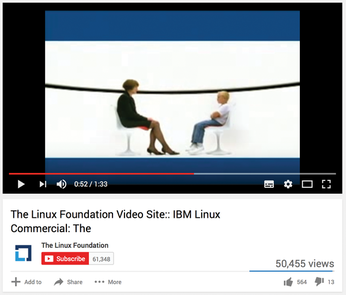Spreading the word – The Art of Advocacy
FOSS Advocacy
Learn the tricks, tips, and techniques for converting friends, family, and colleagues to free and open source software.
When was the last time you saw a TV advertisement for your favorite Linux distribution? Or heard a radio spot about GNU? Chances are you've never come across anything like that – and you probably never will. Awareness of GNU, Linux, and free and open source software (FOSS) is spread largely by word of mouth, using grass roots movements and social media. Many of us got into Linux and FOSS because we knew of friends who were using it or read an article describing someone's experiences in a magazine. We certainly didn't start using Linux back in the late 1990s because of some shiny TV ad (Figure 1).
 Figure 1: GNU/Linux hasn't had much in the way of TV advertising, although IBM did create a video spot many years ago.
Figure 1: GNU/Linux hasn't had much in the way of TV advertising, although IBM did create a video spot many years ago.
As a reader of this magazine, you probably don't need anyone to advocate Linux and FOSS to you. Chances are that you made the decision to use this software long ago, for your own reasons. Even if you dual-boot and just tinker with Linux as a hobby, you've still gone far enough that you're not interested in hearing someone else's arguments for using it.
[...]
Buy this article as PDF
(incl. VAT)
Buy Linux Magazine
Subscribe to our Linux Newsletters
Find Linux and Open Source Jobs
Subscribe to our ADMIN Newsletters
Support Our Work
Linux Magazine content is made possible with support from readers like you. Please consider contributing when you’ve found an article to be beneficial.

News
-
Chaos Comes to KDE in KaOS
KaOS devs are making a major change to the distribution, and it all comes down to one system.
-
New Linux Botnet Discovered
The SSHStalker botnet uses IRC C2 to control systems via legacy Linux kernel exploits.
-
The Next Linux Kernel Turns 7.0
Linus Torvalds has announced that after Linux kernel 6.19, we'll finally reach the 7.0 iteration stage.
-
Linux From Scratch Drops SysVinit Support
LFS will no longer support SysVinit.
-
LibreOffice 26.2 Now Available
With new features, improvements, and bug fixes, LibreOffice 26.2 delivers a modern, polished office suite without compromise.
-
Linux Kernel Project Releases Project Continuity Document
What happens to Linux when there's no Linus? It's a question many of us have asked over the years, and it seems it's also on the minds of the Linux kernel project.
-
Mecha Systems Introduces Linux Handheld
Mecha Systems has revealed its Mecha Comet, a new handheld computer powered by – you guessed it – Linux.
-
MX Linux 25.1 Features Dual Init System ISO
The latest release of MX Linux caters to lovers of two different init systems and even offers instructions on how to transition.
-
Photoshop on Linux?
A developer has patched Wine so that it'll run specific versions of Photoshop that depend on Adobe Creative Cloud.
-
Linux Mint 22.3 Now Available with New Tools
Linux Mint 22.3 has been released with a pair of new tools for system admins and some pretty cool new features.
